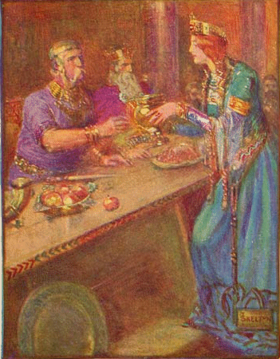Wealhtheow
Wealhtheow est un personnage du poème anglo-saxon Beowulf.
| Wealhtheow | |
| Personnage de fiction apparaissant dans Beowulf. |
|
 La reine Wealhtheow servant son époux Hrothgar (illustration de J. R. Skelton, 1908) | |
| Famille |
|
|---|---|
| modifier |
|
Issue du clan des Wulfings, elle est l'épouse du roi danois Hrothgar et la mère de ses trois enfants : deux garçons, Hrethric et Hrothmund, et une fille, Freawaru. Après la mort de Grendel, elle récompense Beowulf en lui offrant trois chevaux et un collier en or et prononce à cette occasion deux discours, l'un adressé à son mari et l'autre au héros victorieux.
Son nom est couramment interprété comme signifiant « esclave étrangère » en vieil anglais, ce qui pourrait refléter la nature politique de son mariage avec Hrothgar[1].
Dans la culture populaire
modifierAu cinéma et à la télévision, le rôle de Wealhtheow a été interprété par :
- Diane Venora dans Le 13e Guerrier (1999) ;
- Steinunn Ólína Þorsteinsdóttir (en) dans Beowulf, la légende viking (2005) ;
- Robin Wright dans La Légende de Beowulf (2007) ;
- Marina Sirtis dans Beowulf et la Colère des dieux (2007) ;
- Joanne Whalley dans Beowulf : Retour dans les Shieldlands (2016).
Références
modifier- ↑ Orchard 2003, p. 219.
Bibliographie
modifier- (en) Alfred Bammesberger, « The Conclusion of Wealhtheow's Speech ('Beowulf' 1231) », Neuphilologische Mitteilungen, vol. 91, no 2, , p. 207-208 (JSTOR 43345793).
- (en) Josephine Bloomfield, « Diminished by Kindness : Frederick Klaeber’s Rewriting of Wealhtheow », The Journal of English and Germanic Philology, vol. 93, no 2, , p. 183-203 (JSTOR 27710980).
- (en) André Crépin, « Wealhtheow's Offering of the Cup to Beowulf : a Study in Literary Structure », dans Margot H. King et Wesley M. Stevens (éd.), Saints, Scholars and Heroes : Studies in Medieval Culture in Honour of Charles W. Jones, vol. 1, , p. 45-58.
- (en) Thomas D. Hill, « “Wealhtheow” as a Foreign Slave : Some Continental Analogues », Philological Quarterly, vol. 69, no 1, , p. 106-112.
- (en) Leonard Neidorf, « Wealhtheow and Her Name : Etymology, Characterization, and Textual Criticism », Neophilologus, vol. 102, no 1, , p. 75-89 (DOI 10.1007/s11061-017-9538-4).
- (en) Andy Orchard, A Critical Companion to Beowulf, Cambridge, D. S. Brewer, (ISBN 0-85991-766-5).